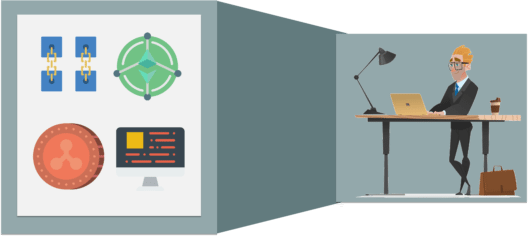Every major company is trying to work its way around blockchain. The demand is growing exponentially, so the need for blockchain developers is also surging. This is the reason why it happens to be such a lucrative field. Additionally, programmers across the globe are trying to learn different types of blockchain coding to earn a decent income. We have crafted this article to aid you in starting your career as a freelancer in the very niche. At the same time, help you secure a reasonable job in the industry as well.
Understand The Basics
This is crucial. Before you start your first blockchain development tutorial, it is important to understand a few core concepts and see how things are connected at an abstract level. It would not only help you to learn blockchain coding swiftly. Additionally, it would prepare you to pass the initial interview at any big organization. This is usually called the screening process. We are not talking about the technical aspects here. You just need to have a fair idea of some of the following and be able to relate them with any given scenario: There are several blockchain protocols in the market now. To secure a dream job, you must be aware of the particular tech stack they are looking for. However, for the start, there is no harm in lacing your mind with general usability. TIP: Most of the potential developers often just read different whitepapers and documentation to get some idea of what’s happening in the industry.
Learn The Processes
Now that you have understood the basics and acquired a reasonable knowledge after reading some whitepapers, it is time to take the next ride for becoming a blockchain developer. Keep in mind that individual elements (mining, decentralization, etc.) mean nothing if there is no rational sequence among them. Besides, it is important for a blockchain developer to know about all this. Therefore, you must go through some already implemented scenarios to understand how stuff works. For instance, let’s assume that after becoming a developer, you are eager to launch your crypto exchange. In such a case, you need to create an account on any platform and trade some coins to have a fair idea. Just to clue you in, plenty of employers are eager to understand if you just “know” the blockchain-related “elements.” However, you can create and integrate them, handle the transfers, and take necessary measure to keep them safe.
Get The Required Education And Code Extensively (Or At Least Start Doing So)
Even though it is not a strict requirement in some organizations, a formal education (at least a BS in an IT-related discipline) enables you to have a distinguished place in the pool of prospects. Apart from being a researcher and a blockchain user, you need to have a decent set of coding skills to secure a position as a blockchain developer. The employers are often keen to explore as to how would you secure a public network. Since it would contain assets worth millions of dollars and as a blockchain developer, you must be certain that there is not even a single loophole on your end. Secondly, you need to build up your coding skills when it comes to resource management. A blockchain ledger is queried via an API several times during a transaction. To make the processes more efficient, managing the preset resources while programming is crucial. It is important to ensure that the scope of scalability won’t halt once the network starts growing and entertaining millions of users.
Knowledge Is Power
Having command on one blockchain protocol is enough for securing a decent job in the beginning. However, it is ideal to have at least “basic to intermediate” knowledge of multiple protocols and frameworks. The reason being, organizations are looking to work in collaboration with one another to boost cross-platform compatibility. If your blockchain development skills are well versed, and you happen to code on different frameworks, you might get an edge. Every major programming language is being used in the blockchain sector these days. However, if you are going to learn from scratch, I would advise you to go for Python, Solidity, and Javascript. Some prestigious universities have also initiated programs that you could take benefit from, and since this is all new, scholarships are also available. However, it is worth emphasizing that practicing and hands-on experiences have no substitute!
What Lies In The Future?
Well, the future is quite bright for the developers and the technology itself. Bitcoin was the first formal implementation of blockchain, and when the coin took a nosedive, the overall performance of the blockchain niche was unaffected. That’s quite self-explanatory! Please note that even the entertainment industry is taking the blockchain technology pretty seriously to stimulate the growth of new use cases. This is to ensure they can incentivize the users while keeping a fair check on the system. Other than that, the big four and all the tech giants in their respective domains have started developing blockchain-based use cases. This is to make their organizations more efficient, secure, and compatible with other technologies. Therefore, it is quite evident that we will certainly observe some astonishing advancements in the years to come. And there is no going back to centralization now.

